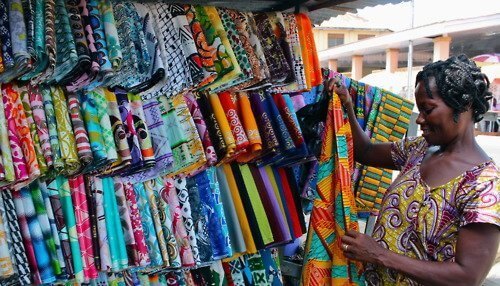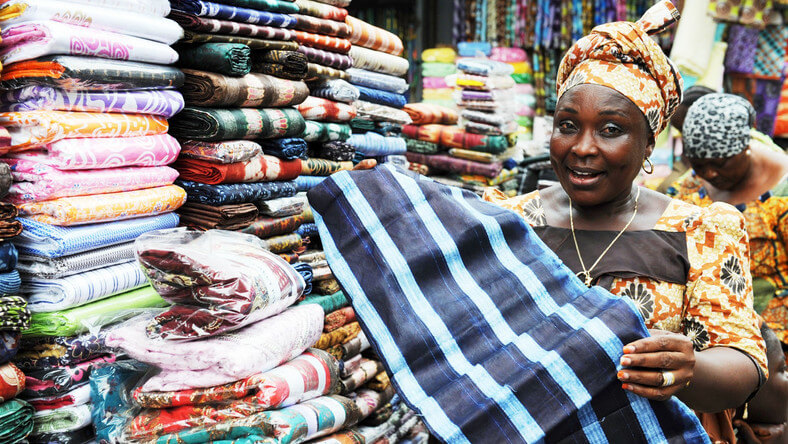The new policy action of the Central Bank of Nigeria appears to have revived hopes for the return of the glory days of the nation’s textile industry, JOSEPHINE WILLIAMS and INNOCENT ENETA write
Nigeria’s textile industry has seen better days. Its glory days were in the 1970s and early 1980s.
Then, the country was said to be home to Africa’s largest textile industry, with over 180 textile mills in operations, which employed close to over 450,000 people.
The industry, at that time, was the largest employer of labour in Nigeria after the public sector, contributing over 25 per cent of the workforce in the manufacturing sector, according to the Central Bank of Nigeria. But the industry has long become a shadow of its former self with many operations closing shop.
On Tuesday, the CBN banned the sale of foreign exchange to importers of all types of textile materials with immediate effect, a move that has been described as a welcome development by many stakeholders.
The CBN Governor, Mr Godwin Emefiele, at a textile industry stakeholders’ meeting in Abuja, lamented the state of the industry, saying over $4bn was spent annually by the country on imported textiles and ready-made clothing.

He said, “It’s no secret that the past 20 years have been very difficult for many textile firms. They have faced rising operating cost and weak sales due to high energy cost, smuggling of textile goods and poor access to finance.
“Many of them have had to lay off employees. Today, most of the factories mentioned have all stopped operations, as only 25 textile factories are operating today at below 20 per cent of their production capacities, and the workforce in Nigeria’s textile industry stands at less than 20,000 people.
”The governor, at the meeting, directed all forex dealers in the country to desist from granting any importer of textile materials access to forex in the nation’s forex market.
He said the CBN would initially support the importation of cotton lint for use in textile factories, with a caveat that such importers would begin sourcing all their cotton needs locally beginning from the year 2020.
Emefiele said given the high domestic demand for textiles, the intervention of the apex bank would help to create jobs for the economy while increasing the production of textiles in the country.
Stakeholders, who spoke with Africana Entrepreneur in separate interviews, said the CBN’s move had given a fillip to the textile industry but voiced concerns over smuggling of textile materials into the country.
The Director, Haffar Industrial Company Limited, Tarek Haffar, said, “Now that the government is giving more protection to indigenous companies, it would encourage the surviving local textile manufacturers to be more competitive and produce more goods with quality and also raise the employment rate, which, in the past, used to employ 250, 000 to 500,000 workers.”
He said small and medium enterprises in the industry would be empowered to strive better and improve revenue generation for the country.
“Although it is not within the jurisdiction of the CBN governor, the smuggling of goods (inferior quality textile materials) into the country, congestions at the ports, and the high cost of power should be looked into as measures to further empower and improve the productivity level of the textile industry in Nigeria,” he added.
The Director-General, Nigerian Textile Manufacturing Association, Kwajaffa Hamma, also believes the CBN’s intervention would help to salvage the industry.
He, however, said, “A lot of smuggling had taken over the market with inferior goods, thereby polluting and further destroying customer’s trust in our products. But through the ban, the industry would rise up to expectation and deliver, as usual, quality textile products that can compete with other fabrics anywhere in the world.
”Hamma said there would be more room for employment of the youth in the manufacture of finished and semi-finished products such as threads, knitting yarns and embroidery threads for onward production of traditional Nigerian attire such as ‘Aso-oke’.
A university don, Prof. Sheriffdeen Tella, praised the CBN for adding textiles to its forex prohibition list, adding that the policy would boost job creation and increase Nigeria’s revenue.
The professor of Economics at the Olabisi Onabanjo University, Ago Iwoye, Ogun State, said the decision would spur investors to channel funds into the industry.
He said, “The CBN forex policy is a laudable one, and I know it will encourage our local textile industry, making it possible for our country to do better. Many farmers will grow and employ a lot of people.
”When asked if he was not worried about Chinese players taking over the industry, he said, “If that happens, it’s good for us because they will bring their technology to Nigeria and empower our people in many ways. They will use our people to work. But if it is in China, they will use Chinese for that.
“The new CBN forex policy is good for us because the importation of textiles is telling on the economy. Nigerians must see what the central bank has done as the way forward for this country. We hope that this will help government increase our (forex) reserves, which have been going down for some time now.
”Tella added, “It will have a positive impact on every entrepreneur in the textile business. All the money which they usually changed into dollars and took out will stay in the country. Many small traders can now buy directly from producers of textiles in Nigeria.
”Addressing the issue of smuggling, the CBN governor assured stakeholders on Tuesday that the bank would work towards making it difficult for smugglers to operate.
He said, “You know the CBN does not carry guns, arms or have to be at the border posts but we know what we will do to make it difficult for those smugglers to bring in those things into Nigeria and we will unfold those to you.
“So, when we make it difficult for them to smuggle those things into the country, it opens the market for you so that those who would have gone to buy those things will be forced to come to you.”
Get real time update about this post categories directly on your device, subscribe now.



